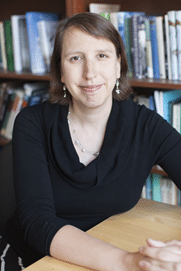Dr. Minda Berbeco On Alabama’s New Science Standards
Alabama’s State Board of Education on Thursday approved new K-12 science standards that will go into effect next school year. Science teachers across Alabama say the new standards are better than the current decade-old ones. We wanted a national perspective too, so WBHM’s Dan Carsen caught up with Dr. Minda Berbeco, Programs and Policy Director for the National Center for Science Education. He asks if she’s surprised there hasn’t been much controversy about standards dealing with politically charged topics like evolution and climate change. Above is the four-minute on-air version. Below are key excerpts and the nine-minute web-exclusive version.
Alabama’s Potential New Standards And Science Itself
“… we’re really pleased that there hasn’t been a strong pushback against the science standards, because it’s just science. And sometimes science is ugly, and sometimes science is uncomfortable, but we can’t really change the science. What we can change is the political response. It’s really important that the science is being taught and it looks like these standards are really trying to connect with what science shows, which is nice to see. You know, I always feel like standards could be even better and they could incorporate more concepts and more ideas, but this is a great starting point.”
The Challenges of Teaching Climate Change
“First and foremost, because the science is very new, they might not have actually learned about climate change themselves when they were in school, so there’s a big professional development piece. Second, though — and I think we can’t overlook this … because it is politically controversial, teachers are really facing challenges not just from students but from parents getting upset that they’re addressing climate change, and possibly also from administrators. We’ve certainly worked with and talked to plenty of teachers who are really concerned about pushback just for teaching the science.”
Alabama’s Potential New Science Standards Embracing Evolution
“We’re really pleased to see that! Some really significant changes in their portrayal of evolution and certainly around the term ‘theory’ as well. So I think we’re cautiously optimistic.”
Education Reporting’s “Dirty Little Secret”: Standards Don’t Always Trickle Down…
“I think that’s a really good point. You can put anything you want into standards, but when the classroom door closes, the teacher’s in charge. And it’s really up to them to bring in the good scientific material. And this is why professional development is such an integral and central part of if you’re going to bring in new standards. You need to make sure teachers have the training and the materials that they need in order to teach to them.”
Below is the web-only extended version of the conversation.
Why haven’t Kansas and Alabama — among other holdouts — expanded access to Medicaid?
Only 10 states have not joined the federal program that expands Medicaid to people who are still in the "coverage gap" for health care
Once praised, settlement to help sickened BP oil spill workers leaves most with nearly nothing
Thousands of ordinary people who helped clean up after the 2010 BP oil spill in the Gulf of Mexico say they got sick. A court settlement was supposed to help compensate them, but it hasn’t turned out as expected.
Q&A: How harm reduction can help mitigate the opioid crisis
Maia Szalavitz discusses harm reduction's effectiveness against drug addiction, how punitive policies can hurt people who need pain medication and more.
The Gulf States Newsroom is hiring a Community Engagement Producer
The Gulf States Newsroom is seeking a curious, creative and collaborative professional to work with our regional team to build up engaged journalism efforts.
Gambling bills face uncertain future in the Alabama legislature
This year looked to be different for lottery and gambling legislation, which has fallen short for years in the Alabama legislature. But this week, with only a handful of meeting days left, competing House and Senate proposals were sent to a conference committee to work out differences.
Alabama’s racial, ethnic health disparities are ‘more severe’ than other states, report says
Data from the Commonwealth Fund show that the quality of care people receive and their health outcomes worsened because of the COVID-19 pandemic.








